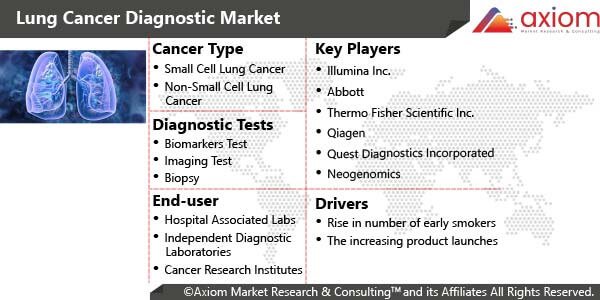Lung cancer is life threatening lung tumour characterised by uncontrolled growth of cell in lung tissues. Smoking cigarette is chief risk factor for growth of lung cancer. Prolonged contact with tobacco smoke can also lead to lung cancer. The diagnosis of lung cancer is authenticated by biopsy which is done with the help of bronchoscopy or CT-guidance. The treatment of lung cancer can done by chemotherapy, radiotherapy, immunotherapy, surgery etc. As per the report issued by WHO, the cancer is leading cause of death worldwide, there are nearly 10 million deaths in 2020 in which 2.21 million deaths are occurred due to lung cancer only.
Market Dynamics- Lung Cancer Diagnostic Market
The lung cancer diagnostic market is anticipated to grow at CAGR of 7.84% during the forecast period of 2021 to 2027. The rising awareness regarding about lung cancer and government regulation for prevention of smoking is also contributing in the growth of lung cancer diagnostic market. The dynamic factors such as rise in number of early smokers is propelling growth of lung cancer diagnostic market. The increasing product launches is also boosting growth of lung cancer diagnostic market. However, high cost of diagnosis is hindering the growth of lung cancer diagnostic market.
COVID-19 Impact on Lung Cancer Diagnostic Market
The exclusive COVID-19 impact analysis report by Axiom MRC provides a 3600 analysis of micro and macro-economic factors on the lung cancer diagnostic market. In addition, complete analysis of changes on lung cancer diagnostic expenditure, economic and international policies on supply and demand side. The report also studies the impact of pandemic on Global economies, international trade, business investments, GDP and marketing strategies of key players present in the market. The COVID-19 has almost affected every market is healthcare industries positively or negatively. The lung cancer diagnostic market is also experienced somewhat negative impact of COVID-19. As due to lockdown, physicians where treating only emergency cases whereby the other diagnostic procedure where postponed. The lung cancer patients are at higher risk of COVID-19 infections. After the slight relaxation the market is growing at significant rates. The market is get resumed with use of mask and maintaining social distancing as per the government guidelines.
Lung Cancer Diagnostic Market- Segmental Overview
The lung cancer diagnostic market is segmented into cancer type, diagnostic test, end user and geography.
Lung Cancer Diagnostic Market by Cancer Type
The lung cancer diagnostic market is comprised of cancer type such as small cell lung cancer and non-small cell lung cancer. In which non-small cell lung cancer is estimated to dominate the market in 2020. The non-small cell lung cancer is common type of lung cancer. Shortness of breath and cough are some of the signs of non-small cell lung cancer. The primary factor for lung cancer is smoking. Most of the peoples affected by lung cancer dies within one year of time span and survival rate after five years is very less. The non-small cell lung cancer spreads rapidly as compared with the small cell lung cancer.
Lung Cancer Diagnostic Market by Diagnostic Test
The lung cancer diagnostic market is comprised of diagnostic test such as biomarkers test, imaging test, biopsy and other tests. The biomarkers test is sub-categorised into the CA test, HER2 Test, ALK Test, Angiogenesis Inhibitors, KRAS mutation test. Likewise, Imaging test is also sub-segmented into computed tomography scan, positron emission tomography scan and chest x-ray. The biopsy sub-segmented into needle biopsy, bronchoscopy biopsy and open biopsy. The biomarkers segment is expected to dominate the market in 2020. The mutation test is accounted for the major market share in the market. The rising incidence of lung cancer is boosting the growth of lung cancer diagnostic market. The growing number of early smokers is also refuelling growth of lung cancer diagnostic market.
Lung Cancer Diagnostic Market by End User
The lung cancer diagnostic market is comprised of end user such as hospital assisted labs, independent diagnostic laboratories and cancer research institutes. The hospital assisted labs are likely to dominate the market in 2020. The rising cases of lung cancer is propelling growth of lung cancer diagnostic market. The rising footfall of patients in hospitals is also boosting growth of lung cancer diagnostic market. The rising number of hospitals is also refuelling growth of lung cancer diagnostic market.
Lung Cancer Diagnostic Market by Geography
The lung cancer diagnostic market is studied for key countries such as North America, Europe, Asia Pacific and Rest of the world. The North America is anticipated to dominate the market in 2020. The rising economic development is healthcare industries is propelling growth of lung cancer diagnostic market. The growing prevalence of lung cancer is also boosting growth of lung cancer diagnostic market. The growing research and development activities in the lung cancer diagnostics is also driving growth of lung cancer therapeutics market.
Key Players in Lung Cancer Diagnostic Market
The major key players operating in the lung cancer diagnostic market are Illumina Inc., Abbott, Thermo Fisher Scientific Inc., Qiagen, Quest Diagnostics Incorporated, Neogenomics, Nanostring Technologies Inc, Myriad Genetics Inc, Roche Holding Ag, Danaher, Agilent Technologies, Astrazeneca, Sanofi, Janssen Pharmaceuticals, Biomérieux Sa, Ge Healthcare, Hologic, Koninklijke Philips N.V, Biotheranostics and Exact Sciences among others.
Key Developments in Lung Cancer Diagnostic Market
March 2021 Agilent Technologies Inc., entered into a definitive agreement to acquire Resolution Bioscience Inc., a leader in the development and commercialization of next-generation sequencing (NGS)-based precision oncology solutions.
March 2020, Thermo Fisher Scientific entered into a partnership with Janssen Biotech, a part of Johnson & Johnson to develop lung cancer companion diagnostic.
July 2020, AnchorDx, a leading biotechnology company developing novel NGS-based early cancer detection and disease monitoring tests, entered into a multi-year collaboration with the Lung Cancer Initiative at Johnson & Johnson to conduct a lung cancer study.
June 2019, Roche, launched in-vitro lung cancer diagnostic test VENTANA ROS1 (SP384) to target ROS1 positive lung cancer.











